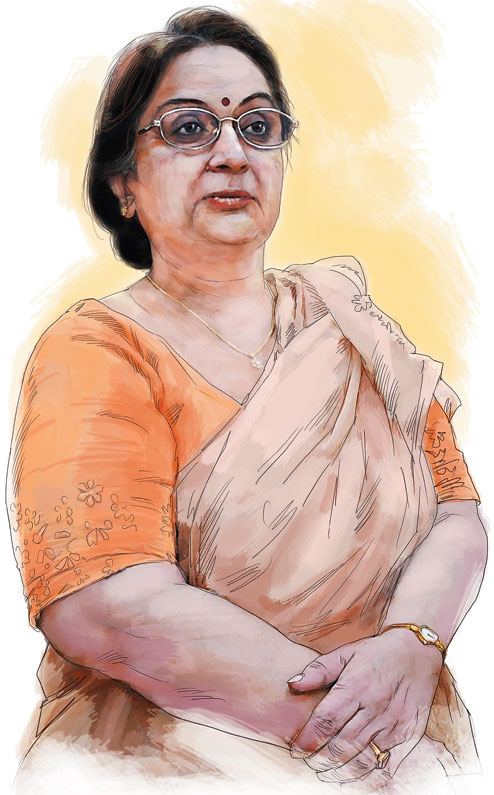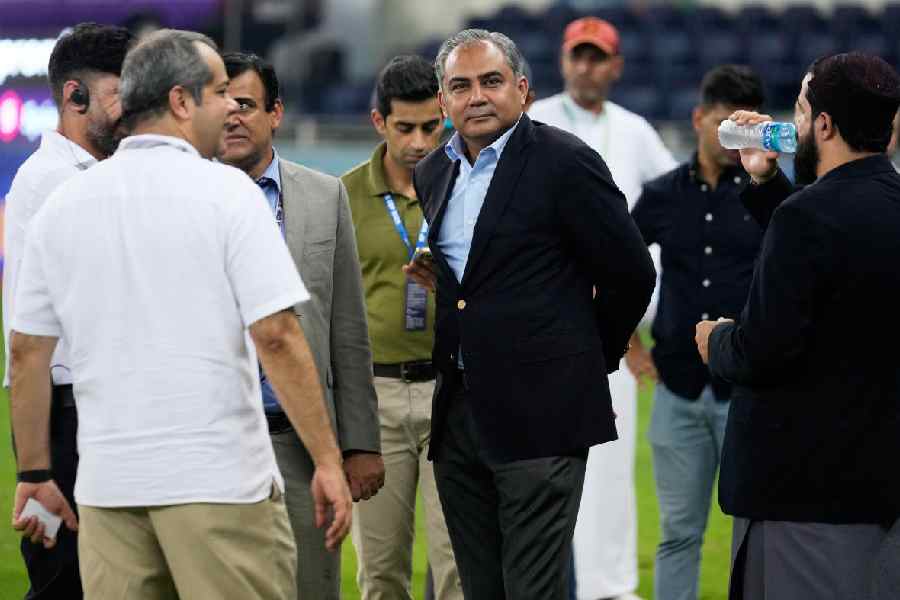
Nitish Katara looks at the world with a half smile from his portrait up on the wall. His mother beams. And she has good reason to. After all, Neelam Katara has just won an almost 14-year-long battle for justice for her son, having single-handedly ensured a conviction for his murderers.
"I couldn't sleep the first night after the Supreme Court judgment," Katara, 63, says. "I have lived for this day for all these years."
Earlier this week, the Supreme Court upheld the conviction of Vikas and Vishal Yadav and Sukhdev Pehalwan, a contract killer. In February, the Delhi High Court sentenced the Yadav cousins to jail for 30 years and Pehalwan for 25 years. The apex court is yet to examine the quantum of sentence - and Katara wants death for them.
"I want the convicts to get the death sentence," she says. "But if the court thinks that is not possible, they should be sentenced to life without remission. I want all three of them to be behind bars forever."
The judgment, Katara says, should be seen as a landmark verdict on honour killings. Vikas disapproved of his sister Bharti's relationship with her classmate, Nitish. The Yadavs had money and muscle power - their father, D.P. Yadav, has high political connections, was a member of Parliament and had been charged with crime.
Katara is confident that the court will not disappoint her. She looks calm and composed - and has never been seen in public as a grieving mother. "If I had engaged in self pity, I wouldn't have come this far," she says.
She did not break down even when she had to identify the charred body of her 24-year-old son, who had been battered to death with a hammer and then set on fire. "I thought I would collapse when I saw the body. But I gathered myself," Katara says.
"I could identify him by looking at his small hands and legs, which were unusual when compared to his tall and broad body. His face was charred. It was so different from when I saw him last, when he dressed up and left for a wedding," she recalls.
That was the evening of February 16, 2002. Bharti's childhood friend was getting married in Ghaziabad. Nitish attended it - and was taken for a drive from the venue by Vikas and Vishal.
When he did not return home till midnight, Katara started worrying. "I called him around 1am. First, nobody answered the phone and then somebody picked it up and disconnected it," she recalls.
Around 3am, Nitish's friend Bharat reached their house. He was at the wedding, and couldn't locate Nitish. Katara called Bharti up - and heard that she was looking for him, too. "She said that I should call her father because he would know about Nitish's whereabouts," she says.
Katara lodged an FIR naming Bharti, Vikas and Vishal. The search continued for another day. On the fourth day, the police called her to verify whether a charred body found in Khurja in Uttar Pradesh was that of her son. The postmortem report said that he had died around 2:45am on February 17.
D.P. Yadav reacted with anger. He told the media that he didn't know who Nitish was, and maintained that his son had been named in the FIR because of a conspiracy to jeopardise his political career.
"I couldn't take it. So I decided to leak out mails that Bharti had sent to my younger son, Nitin, soon after Nitish went missing. In the mail, she wrote that her father was only concerned about the elections, saving his son and his own political career."
Three days after Nitish's body was found, Vikas and Vishal Yadav got arrested from Dabra in Madhya Pradesh. Four years later, in November 2006, Bharti deposed before the court, denying that she had been in a relationship with Nitish.
"I was disappointed," Katara says. "I thought Nitish should have chosen someone better."
Nitish met Bharti while he was studying for an MBA at a private business school in Ghaziabad. They dated for almost three years. Three months before Nitish's death, he told his mother that he wanted to marry her.
"I didn't know much about her family. All I knew was that D.P. Yadav was a politician and Vikas Yadav had been named in the Jessica Lal murder case. I was not keen on the match," she says.
She met Bharti briefly on a few occasions. She often received the bouquets and cards that Bharti would send for Nitish. Three days before his death, on Valentine's Day, Bharti had sent him cards with their photographs.
Bharti used to visit Nitish at their government residence on Chelmsford Road in central Delhi, a railway colony where Katara still lives. "She would park her car here and then the two would go out in our car. But I never had a chance to have any longish conversations with her," Katara says.
Within 18 months of Nitish's murder, his father, who worked for the Indian Railways, died. He had for long been suffering from a neurological disease and the condition deteriorated after his son's death. He lost his speech in the last few days and was communicating with family members with a few scrawled messages. "Once, he scribbled: 'Chimpu (Nitish's pet name) committed a mistake. He shouldn't have gone with Vikas in the car'," she remembers.
Neelam, a Kashmiri who grew up in Lucknow, fell in love with her friend's brother, Nishit, while studying in Loreto Convent. Though both were Brahmins, the two sets of parents were not in favour of the match because they were from different communities.
"But we were determined to get married. I was ready to elope but my husband wanted the consent of both the families. And finally, we did get their consent," Katara says.
His death shattered her. "I didn't know what to do," she recalls. "But then I remembered that when my husband was diagnosed with the disease, Nitish had told me that he would be very ashamed of me if I ever become weak. His words gave me the strength to stand up and fight back."
Nitish went to Modern School, Barakhamba Road in central Delhi, and then studied economics at Delhi's Sri Venkateswara College before joining the business school. He also worked for a private insurance company, whose office was on Barakhamba Road.
"I used to tell him, you will spend all your life in this area. To this, he used to reply, ' Jab jaoonga yahan se, tab aisa jaoonga, aap dekhengi' (You will be surprised to see the way I leave this place)," she says.
Katara is happy talking about her son. Apart from photography and Sufi music, Nitish loved wildlife. "He used to drive his favourite blue Gypsy to the Corbett national park every year," she says. He went to Corbett with Bharti and her mother, sister and brother-in-law too. The last holiday that the Kataras had together was at the Kanha national park in July 2001.
After Nitish's death, there has been no scope for a holiday. Her life has revolved around courts and lawyers' offices. When the courts are on vacation she visits Nitin, who works at the Interpol at Lyon in France. "I couldn't leave Delhi when the courts were open. I had to follow my case very closely," she says.
Dressed in a blue chiffon sari, Katara is a picture of elegance. The pearl ear tops and bracelet complement her sophisticated look. She wears an aquamarine stone on a left finger to keep a check on her blood pressure. She doesn't believe in astrology, she says, but recalls visiting an astrologer with Nitish when her husband's health was deteriorating.
"The astrologer had advised us not to discuss Nitish's wedding plans before March 2002. She also told us to protect Nitish from the 'evil eye' on Saturdays. He was killed on a Saturday. He may have been alive if I had taken the astrologer seriously," she says.
But she doesn't hold regrets anymore. Her mission to get justice for her son has nearly been accomplished. But, Katara says, she has changed completely as a person in these years. From a passionate teacher and a loving mother, Katara has become a fighter - a symbol of a common man's successful fight against the powerful.
But now that Neelam Katara's battle has been won, what lies ahead for her? "Now that it has come, there is a feeling of sudden emptiness," she replies.
The retired deputy commissioner (academics) at the Kendriya Vidyalaya Sangathan says that she now wants go back to her original loves - theatre and ghazals.
And occasionally, she wishes her husband and elder son were there with her. "I miss being what I was," she says.










